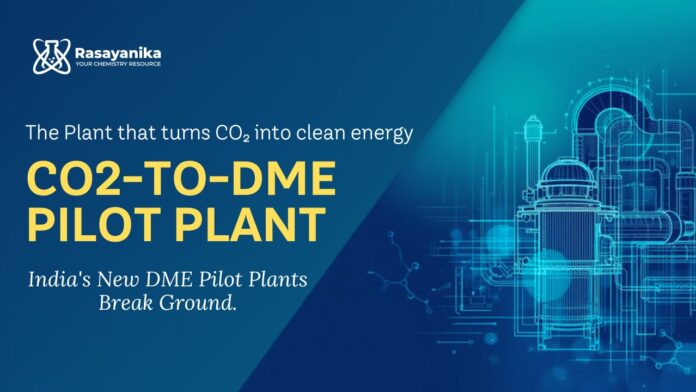The Plant that turns CO₂ into clean energy: India’s New DME Pilot Plants Break Ground
Can you imagine a future where CO₂, instead of warming our planet, could power our homes and produce clean, usable fuels? Godavari Biorefineries and ICT Mumbai have launched a breakthrough pilot plant that can convert CO₂ into DME. DME or Dimethyl ether is a low-emission, sustainable fuel. We are constantly warned about emissions going up and climate change getting worse. The project feels like a rare moment where science, technology, and sustainability are moving forward together.
The idea behind this discovery is actually simple. Scientists have captured the CO₂ and turned it into a valuable product instead of releasing it into the atmosphere. The concept of capturing carbon has been around for many years, but the project of converting CO₂ into a commercially valuable fuel is a much tougher challenge. That is where the pilot plant comes into play. It shows that with the right technology and partnerships, the carbon we usually treat as waste can actually become an asset.
DME is known for its clean-burning properties and also has the potential to replace Liquefied Petroleum Gas (LPG) and diesel. It produces fewer pollutants when burned compared to fossil fuels. That means it can help to decrease carbon emissions by using fuels from industries that rely on alternative fuels rather than conventional fossil fuels. In other words, it is not just reducing the problem; it is offering a new way forward.
What sets this project apart is that it is practical to achieve. Many climate solutions sound promising in theory, but struggle to be implemented. This pilot plant, however, is already operational, proving that the technology can work outside of a lab. By accessing this model, industries could one day integrate CO₂ to DME conversion into their existing systems, turning their own waste gases into usable energy. Factories will not only reduce their carbon footprint but also generate part of their own fuel using captured emissions.
The collaboration between Godavari Biorefineries and ICT Mumbai also highlights the power of academic and industry partnerships. ICT brings deep research expertise, while Godavari Biorefineries brings experience in sustainable chemical production. Together, they’ve created something that neither could have accomplished alone. It’s a reminder that solving climate challenges often requires not just groundbreaking ideas, but strong alliances that can turn those ideas into reality.
This is only the beginning. As with any new technology, scaling up will take time, investment, and careful testing. But the pilot plant marks a major step in the right direction. It suggests a future in which industries don’t just minimise harm, they actively help create cleaner energy sources.
In a world searching for solutions to climate change, projects like this offer something invaluable: realistic optimism. It’s proof that innovation isn’t just about inventing new things sometimes, it’s about reinventing what we already have, even if that “something” is as simple as the air we breathe.

















































